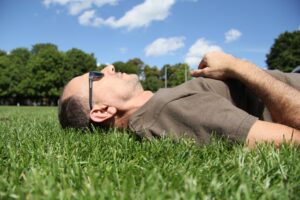Acupuncture and Botanical Medicine for BPH
 BPH stands for benign prostatic hyperplasia, a condition in men in which the prostate gland is enlarged but not cancerous.
BPH stands for benign prostatic hyperplasia, a condition in men in which the prostate gland is enlarged but not cancerous.
The prostate is a walnut sized gland deep in a male’s anatomy wrapping itself around the urethra (outflow urine tube) and in charge of adding protective fluid, called semen, to sperm. When the prostate enlarges, minimal to painful symptoms can present such as:
- Difficulty urinating
- Feeling that the bladder never fully empties
- Frequent urination, especially during the night
- Testicular pain
- Weak urine flow
- Painful urination
- Recurrent UTI (urinary tract infection)
About 19 million men, starting at about age 40, exhibit signs of BPH and by age 60 it increases to approximately 50% of males, rising to an alarming 90% by age 80. The cause of BPH is not entirely known however some attribute it to family history, poor diet, age, hormonal imbalance, over-the-counter cold and sinus medicines, frigid weather, and stress.
Conventional medicine has been attempting to tackle this condition through pharmaceutical intervention such as anti-inflammatory, hormone manipulating and bacteria fighting medications. In addition, invasive procedures such as a cystoscopy (aka bladder scope, administered through the penis) may also be performed along with a possible surgical procedure to rule out cancer.
Before it gets to such a point, a change to a more “live food” diet (fresh fruits, vegetables, legumes and grains) along with acupuncture and botanical medicine for BPH may be an excellent remedy to ward off more serious prostate problems.
The Eastern Example
Acupuncture began in the far east over 2,000 years ago (some theorize much further back) and has finally been fairly integrated into western society. Doctors, hospitals and a majority of the medical industry embrace its healing results for a wide variety of applications, including BPH.
A Chinese study of acupuncture for BPH published in PLoS One (April 12, 2013) concluded that,
“In the present study, acupoint EA [electroacupuncture] at BL 33 [Bladder 33 located in the region of the sacrum – lower spine] had better effects on IPSS [International Prostate Symptom Score]…The results indicate that EA is effective in improving patient’s quality of life and acupoint may have better therapeutic effects than non-acupoints in acupuncture treatments of BPH.”
Classical Chines Medicine considers BL 33 the meeting point of the bladder and gallbladder channels capable of regulating the ‘lower burner’ as well as strengthening the legs and back. In the study, subjects received 16 electroacupuncture treatments over one month.
Electroacupuncture is often a standard approach by most acupuncture practitioners where a minimal, painless electrical charge is administered through specific needles. Some theorize that BL 33 enhances sacral neuromodulation, a physiological process where a given neuron (nerve impulse cell) uses one or more neurotransmitters to regulate diverse populations of neurons. In turn, this has the potential to reduce prostate inflammation as well as enhance urine flow which is often impinged by BPH.
Nature’s Toolbox
Botanical medicine is like a veritable natural toolbox full of all sorts of healing capabilities. When it comes to BPH, these herbal remedies have shown some great promise.
Rye Grass Pollen Extract
Rye grass pollen extract is made up of 3 types of grass pollen – rye, timothy and corn.
A study of rye grass pollen for BPH by researchers at The DVA Coordinating Center of the Cochrane Collaborative Review Group in Prostatic Diseases and Urologic Malignancies, published in the British Journal of Urology (May 2000), concluded that,
“The available evidence suggests that Cernilton [a rye-grass pollen extract brand] is well tolerated and modestly improves overall urological symptoms, including nocturia [excessive nigh time urination] .”
In addition, the University of Maryland Medical Center states that rye grass pollen may reduce an enraged prostate and those who took rye grass pollen reported of feeling a more complete emptying of their bladder.
Do not take rye gras pollen if you have allergies to any grass pollens.
Stinging Nettle
This root of the stinging nettle plant showed significant results in a study published in the Iranian Red Crescent Medical Journal (January 2013) which stated that,
“In three clinical trials on BPH patients, nettle had a better impact in reducing patients’ clinical symptoms than placebo. As a whole, nettle is recommended to be used more in treatment of BPH patients, given its beneficial effects in reducing BPH patients’ symptoms and its safety in terms of its side effects and its being better accepted on the side of patients.”
Saw Palmetto +
Saw palmetto is a plant that looks like a small palm with berries. These berries were used by southwestern Native American indians as a food and medicine and in the 1900’s to address male issues including sperm production, libido and urinary tract issues.
There are varying studies of the effectiveness of saw palmetto alone however good research according to Penn State Milton S. Hershey Medical Center shows that adding selenium and lycopene has “shown even greater anti-inflammatory activity”.
Acupuncture and botanical medicine for BPH offers a natural, dual pronged approach for maintaining a healthy prostate. It may be an excellent remedy or preventative that can supersede conventional medicine’s potential side effects and possible invasive procedures.
At Integrative Med Solutions, we will design an acupuncture and naturopathic treatment program that works for you. In many cases, insurance covers portions of the acupuncture treatment. Allow us to support you to achieve optimal health. To make an appointment or find out more about how acupuncture and naturopathic medicine can benefit you, please call our office at 914.337.2980 or CLICK HERE to schedule an online appointment.
*Please CLICK HERE to see a current list of Insurance Companies that commonly carry acupuncture benefits for its members. Please call 914.337.2980 or securely email info@intmedsolutions.com to verify your specific benefits. If you are emailing, please include your full name, date of birth and insurance identification card number.
